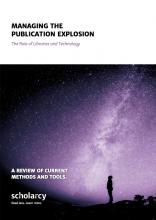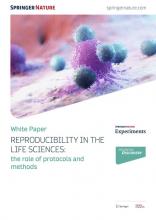OCLC launch "milestone in long-term linked data strategy"
Launch creates, curates, and connects linked data entities to improve metadata visibility
Launch creates, curates, and connects linked data entities to improve metadata visibility
The MLAs were created to recognise the top products and services in the library industry
Organisations to provide dedicated resources and advocacy
Victoria Suslak explores the various choices that libraries have when acquiring content

This paper takes a look at the methods and technologies librarians can adopt to effectively teach research skills in an environment of exponentially rising research output, increased use of mobile devices, and less available time for focused research. We outline some of the most pressing challenges for librarians teaching research skills today, and present an overview of tools and technologies emerging to solve these problems.

Get you FREE White Paper from Springer Nature Experiments.
Reproducibility in the life sciences: the role of protocols and methods.
In this white paper we will shine a spotlight on irreproducibility and explore: A case study looking at tackling reproducibility in high-impact cancer biology research, Actions to drive better reproducible science, Ensuring reproducibility through the publishing process, The changing roles for librarians in supporting reproducibility and Where we are now and the role of protocols in supporting the future of reproducibility
